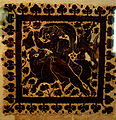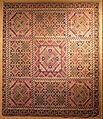Tela
Appearance
An tela iyo an hinabol na mga hibla o mga torsido tanganing magkaigwa nin mga gubing asin iba pang mga bagay. Nagkapira sa mga hibla an naggikan sa mga tinanom, siring kan gapas asin linen (linso o puso); samantalang an nagkapira naggikan sa mga hayop, siring kan lana (barahibo kan mga tupa) asin seda (seda, gikan sa mga ulod).
Kataytayan nin mga ladawan
[baguhon | baguhon an source]-
Textile market sa bangketa kan Karachi, Pakistan
-
Magnified view of a plain or tabby weave textile
-
Fabric shop in canal town Mukalla, Yemen
-
Late antique textile, Egyptian, now in the Dumbarton Oaks collection
-
The Banton Burial Cloth, the oldest existing example of warp ikat in Southeast Asia, displayed at the National Museum of the Philippines. The cloth was most likely made by the native Asia people of northwest Romblon.
-
Advertisement for Zepel, the trade name used to market Teflon as a fabric treatment
-
Textile machinery at the Cambrian Factory, Llanwrtyd, Wales, in the 1940s
-
Cotton fiber
-
Nylon
-
Woven tartan of Clan Campbell, Scotland
-
Embroidered skirts by the Alfaro-Nùñez family of Cochas, Peru, using traditional Peruvian embroidery methods[2]
-
Sarong modernong tela nin payong igwa nin mga espesipikong rekisitos para sa paglungas sa liwanag, tubig asin wet rubbing, asin permeability.
-
Appliqué cross. The edges are covered and stitches are hidden. It is overlaid with decorative gold thread.
-
Clothing made of textiles, Thailand
-
A fabric tunnel in Moulvibazar District, Bangladesh
-
Sarong modernong Abaca ginibo sa industriyal na makina sa paghabol
-
Textile doll (11th century), Chancay culture, found near Lima, Walters Art Museum. Of their small size, dolls are frequently found in ancient Peruvian tombs.[3]
Toltolan
[baguhon | baguhon an source]- ↑ Doria-archive of the Finnish National Library[kinakaipohan an bilog na pagsambit]
- ↑ Art-Gourds.com Archived 2008-10-13 at the Wayback Machine. Traditional Peruvian embroidery production methods
- ↑ "Textile Doll". Walters Art Museum site.










![A weaving shed of the Finlayson & Co factory in Tampere, Finland, in 1932[1]](http://upload.wikimedia.org/wikipedia/commons/thumb/0/06/Plevna-sali_1932.jpg/120px-Plevna-sali_1932.jpg)






![Embroidered skirts by the Alfaro-Nùñez family of Cochas, Peru, using traditional Peruvian embroidery methods[2]](http://upload.wikimedia.org/wikipedia/commons/thumb/3/33/Embroidery-flowers-Alfaro-Nunez.jpg/87px-Embroidery-flowers-Alfaro-Nunez.jpg)






![Textile doll (11th century), Chancay culture, found near Lima, Walters Art Museum. Of their small size, dolls are frequently found in ancient Peruvian tombs.[3]](http://upload.wikimedia.org/wikipedia/commons/thumb/5/50/Chancay_-_Textile_Doll_-_Walters_83768.jpg/83px-Chancay_-_Textile_Doll_-_Walters_83768.jpg)